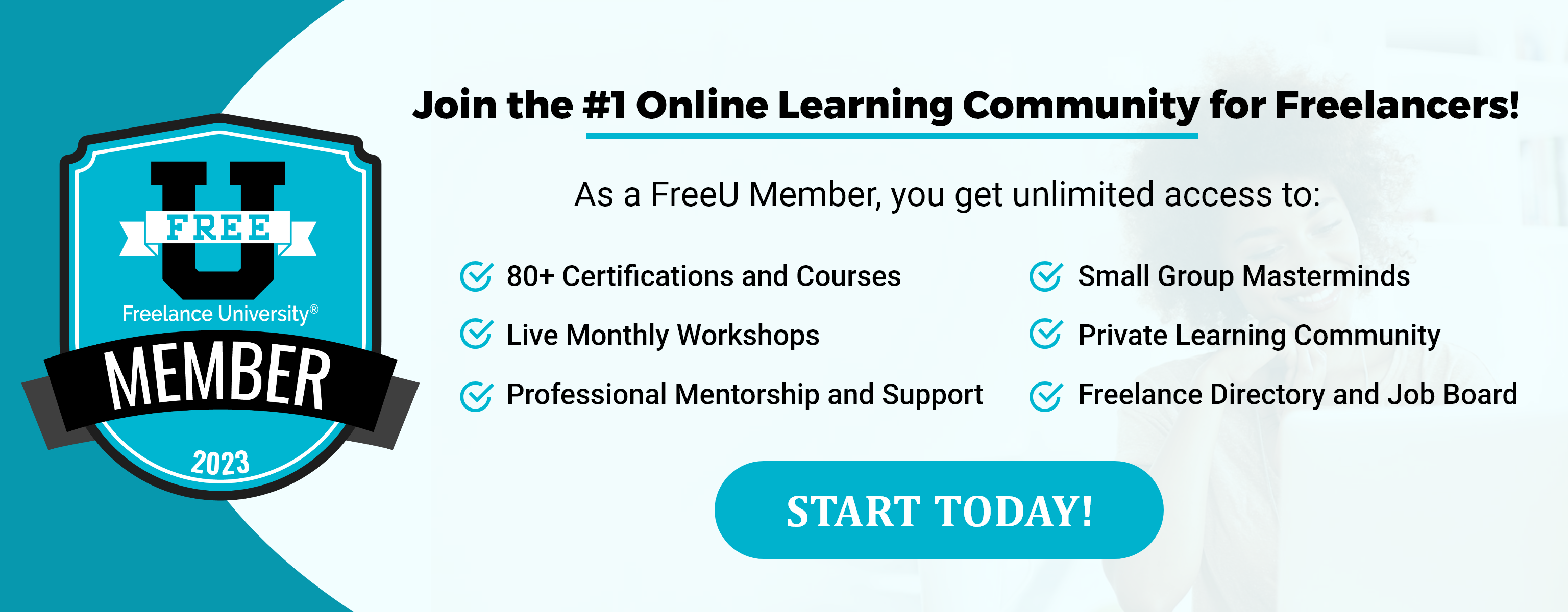Five Ways to Legally Protect Your Freelance Business
By Jena Kroeker
Have you legally protected your freelance business? It’s a question that can send shivers down the most seasoned freelancer’s spine. In a previous FreeU blog post, we discussed ways to help prevent late or missed payments from clients. We also provided strategies for dealing with clients who don’t pay on time or have not yet paid you.
And we talked about how New York City became the first city in the United States to protect independent contractors and freelancers from these types of nonpayment situations. A recent Freelancers Union article celebrates the second anniversary of the “Freelance Isn’t Free” Act and invites freelancers who have successfully filed a claim to share their stories.
But not all of us are protected by a law like this, and nonpayment situations are not the only things we need to guard against. The number of freelancers has grown by 3.7 million in the United States over the last five years, according to the 5th annual “Freelancing in America” study, but it’s still up to us to do as much as we can to safeguard our businesses.
With that in mind, here are five ways you can legally protect your freelance business:
*Please note that this blog post is not a substitute for professional legal advice. Consult the laws of your particular region and contact a lawyer for specific advice.
1. Include the appropriate elements in your website.
When you visit the Freelance University website, you’ll see two elements at the bottom: a Privacy Policy and Terms of Service. These may not be the first things a web visitor clicks on, but they’re there for an important reason. Nesha Woolery explains it this way in her article, “5 Legal Tips Every Freelancer Needs To Know,”
“If you use a website or blog to promote yourself and your work, you need to make sure that you have legal protections in place. This is often the first place where potential clients will stop, so you want to give them a solid first impression and show them that you are a professional who is on the up-and-up regarding the legal side.”
These elements protect your content and show how you run your business. As an example, the FreeU Privacy Policy provides information about the following:
• Eligibility To Access Freelanceu.Com Programs And Services
• How We Collect Information
• How To Receive Consent
• How To Withdraw Consent
• Payment Data Storage
• Disclosure Practices
• Security Of Personal Information
• User Ability To Access, Update, And Correct Personal Information
• Third-party Services
• Changes To Privacy Policy
• Questions And Contact Information
And the Terms of Service or Website Terms of Use include elements like this:
• Agreement
• Privacy Policy
• Changes To Agreement And Privacy Policy
• Eligibility
• User Information/Password Protection
• Billing And Membership
• Intellectual Property
• Disclaimers; Limitation Of Liability
• Governing Law; Jurisdiction And Venue
• And many other important elements
In addition, our FreeU Privacy Policy was updated to comply with General Data Protection Regulation (GDPR) guidelines, effective May 25, 2018. As Danny Palmer explains in his article, “What is GDPR? Everything you need to know about the new general data protection regulations,” any organization operating within the European Union (EU) and any organizations outside the EU that offer goods or services to businesses or customers within the EU must comply with the GDPR.
He says,
“At its core, GDPR is a new set of rules designed to give EU citizens more control over their personal data. It aims to simplify the regulatory environment for business so both citizens and businesses in the European Union can fully benefit from the digital economy.”
If you collect data from clients or customers operating within the EU, you’ll need to make sure your website is GDPR compliant.
2. Choose your business registration wisely.
In our Freelance 101 course we discuss how to build your personal brand and set up your business structure. As FreeU co-founder and instructor Craig Cannings says, your personal brand “Determines the distinctive way you want to be perceived and remembered by others.” It also “sets you apart and makes you unique in the Freelance space.”
To protect this uniqueness, register your business name and consider trademarking it. As Nellie Akalp explains in an article titled “4 Key Tips for Legally Protecting Your Business,” it’s important to check whether the business name you’ve chosen is legally available to use. For example, in the United States, you can do a trademark search to see whether anyone else has trademarked a particular business name. You can also do a name search to make sure it isn’t already being used by another company in your state. She explains, “Registering your name allows you to operate your business under that name in the state legally, and it ensures no other business can use your name in your state.”
When choosing a business structure, you must determine whether you’d like to register as a sole proprietor or incorporated business. Our Freelance 101 course gives a comparison of the two structures. In a sole proprietorship, “YOU are the owner and personally
liable for the business,” but in an incorporated business, “shareholders in a corporation are
not liable for corporate debts.”
The article above puts it this way:
“An LLC and corporation, on the other hand, establishes your business as an entity separate from you the owner. Your personal assets and liabilities are independent of those of your business. So, in the event your business can’t pay its bills or gets sued by a client, your personal bank account, home, retirement funds, etc. will have some protection.”
But in an article titled “Branding Yourself: Why Freelancers Need a Personal Brand,“ Xavier Morales, Esq. warns that an LLC “doesn’t offer umbrella protection for your brand.” Consequently, he recommends trademarking both your logo and business name by registering them separately.
3. Determine whether you need a business license.
This section of our blog post will be shorter than the others because business licenses are not always needed. It depends on what type of service you provide. A Freshbooks article titled “Freelancing 101: 7 Legal Documents All Freelancers Need” recommends checking with your city, county or state’s websites to determine what permits or licenses are required. It explains,
“Business permits and licenses come in many different forms. In some areas, you may be required to have a general business license from your city or county to run a company. In other cases, your profession may dictate your licensing requirements – plumbers, contractors, estheticians and accountants are just a few of the freelance occupations that require a permit to demonstrate proficiency.”
In my home province, I’m able to go on the provincial website, indicate what city or municipality my business operates in, enter a keyword to describe my business, and then select from a number of permits or licenses that may apply to me. If you’re unsure of whether your business needs a license, check your local website for more information.
4. Choose the right type of insurance for your business.
When it comes to insurance, there are many companies and many different options. I recommend doing research in your area and sitting down with an insurance expert to determine what’s best for your business.
If you’re renting an apartment, you may need to include terms in your tenant insurance giving you permission to conduct business on the premises. If so, the insurance agent could ask whether you’ll have clients on site and whether you’ll have merchandise on site. For example, a guitar teacher may have clients come over to her apartment for lessons, but a freelancer or virtual assistant can conduct business through video chat or by meeting at a coffee shop. You may need to ask for special insurance if clients will be coming to your house to do business, or if you’re selling merchandise.
Some other terms to consider including in your insurance policy are
• Professional Liability Insurance (a.k.a. Errors and Omissions insurance)
• General Liability Insurance
• Commercial Property Insurance
• Cyber Liability Insurance
As an example of Professional Liability insurance, the Insureon website says a client could sue a web designer, claiming that a project was delayed by errors in technical plans and resulted in lost revenue. Professional Liability insurance could then pay for an attorney and judgements if the case is lost, even if the designer didn’t make an error.
Similarly, Cyber Liability insurance can protect you from a data breach lawsuit if you collect sensitive customer data and your electronic data is stolen. As the article says, the type of work you do will determine the type of coverage you need, and letting your potential clients know you are insured can give you an “edge over your competitors.”
5. Protect yourself through your client agreement.
In a moment of naivete, I once asked a client, “Would it be better for you if I have a contract?” To which she wisely replied, “Actually, the contract will benefit you.”
According to the article above,
“A contract is not a guarantee that nothing bad will happen or that you are absolutely guaranteed to get paid (always a big concern!) but they can certainly help you to avoid issues and resolve disputes. Worst case scenario: if either of you needs to take legal action, the contract can be good evidence of what you both agreed to at the outset.”
Consult a lawyer for more detailed advice on what to include in your contract. For the purposes of this blog post, we’ll highlight the following elements to consider including:
• Payment schedule
• Termination
• Copyrights
• Ownership of Ideas
Creating a payment schedule can help prevent nonpayment situations. For example, my contracts typically state my rates, when I’ll invoice the client, and when the client’s payment is expected.
A termination clause can prevent you from being left high and dry by a client, or give you an escape hatch if you’re in an unhealthy client relationship. You can decide how much notice will be given for the contract to be cancelled by either party.
Copyrights and ownership of ideas are especially important for freelancers who do creative work. An article titled “The Complete Guide to Freelancing” stresses that it’s important to specify who owns the work once it’s finished. Do you own it? Does your client own it? Can you display examples of the work in your portfolio? Consult the copyright laws of your region for more information.
In his article, “Essential Clauses All Freelancers Must Remember About Copyrights,” Abdullahi Muhammed warns that unfortunately it’s impossible to protect ideas with copyright. For example, if you talk about an idea for an article with a potential client, you can’t prevent them from using your idea with a different writer. So, the key is to be careful about pitching your ideas before securing the project.
And there you have it – five ways to legally protect your freelance business. This is not an exhaustive list, but a guide to inspire your research so you can determine whether you’re doing all you can to protect yourself.
Please share your thoughts or questions in the comments below. What tips or strategies have you used to legally protect your business as a freelancer or virtual assistant?










































































































